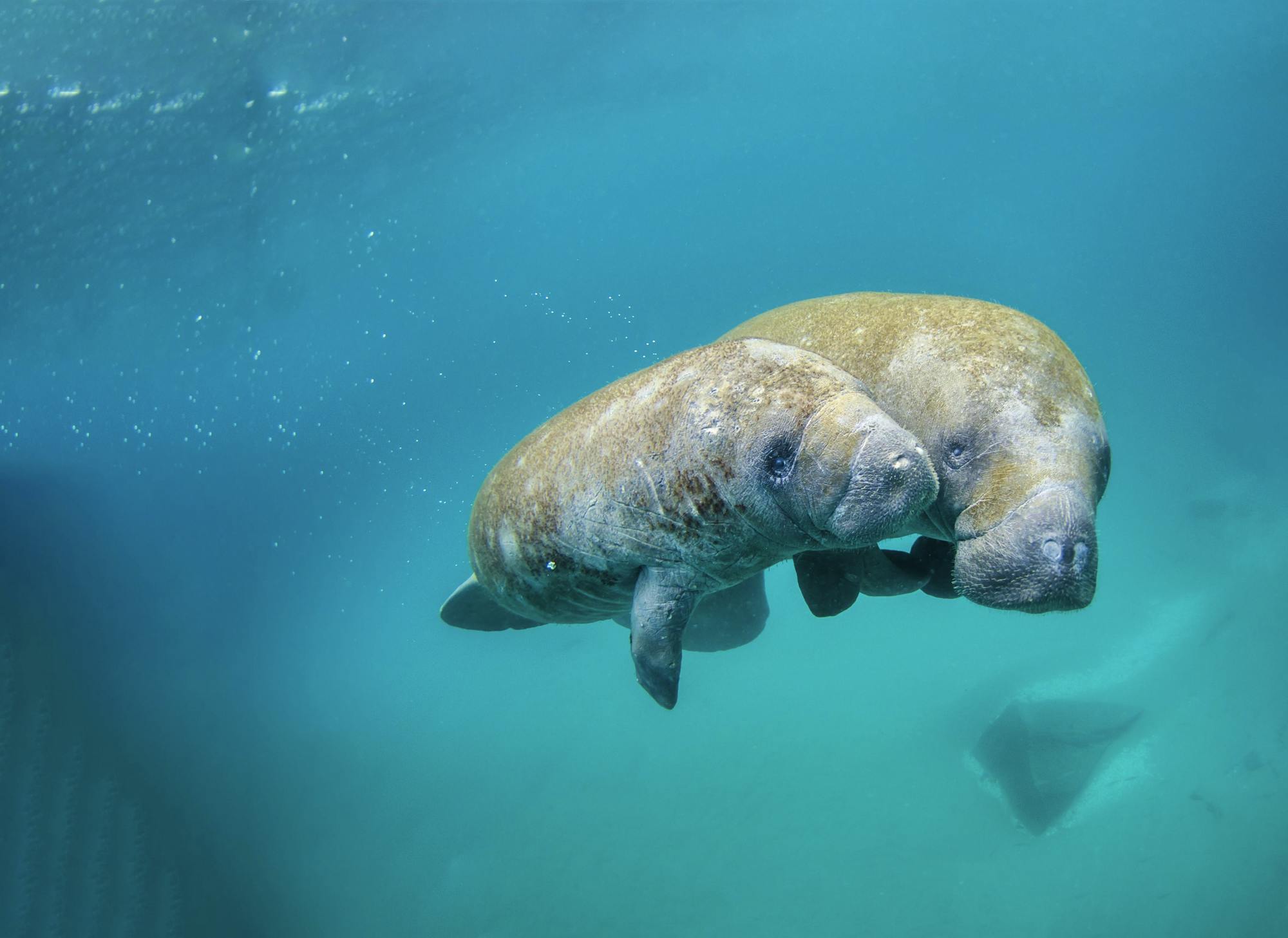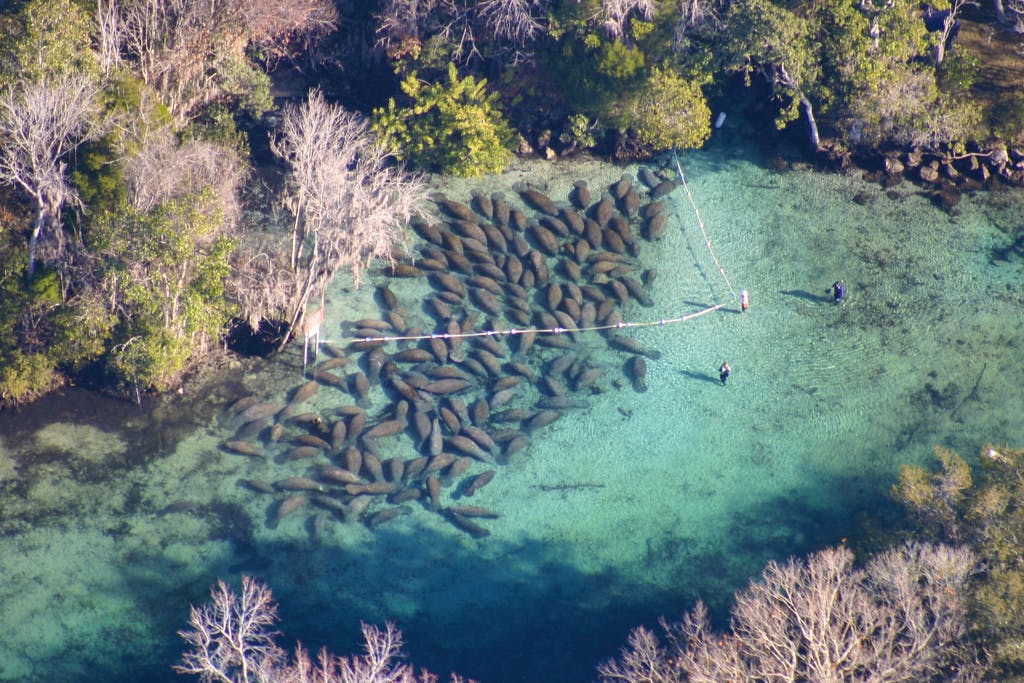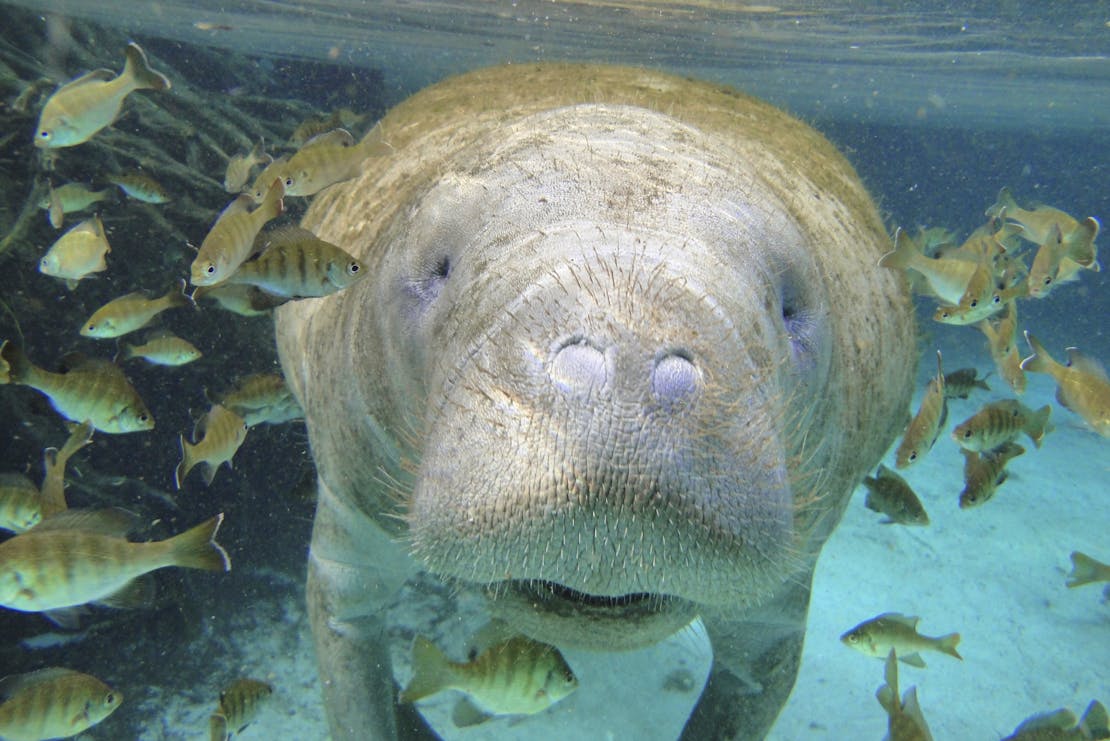November is Manatee Awareness Month. It’s also a chilly time of year for the U.S. As you bundle up to stay warm this winter, spare a thought for the vulnerable manatee. Lacking the thick blubber layers of other marine mammals, and with a slower metabolism which means that their bodies produce less body heat, manatees are very susceptible to the cold. If temperatures drop below 68 degrees F for extended periods, manatees can suffer cold stress syndrome. This is similar to hypothermia, and while severe cases can kill manatees outright, even mild cases can make them more vulnerable to other threats. Inflicted manatees display weeping sores on their skin, they start to lose weight and become thin and emaciated, their immune systems become weakened, making them more susceptible to disease and pollutants, and they also become lethargic and less able to avoid boats.
But due to habitat loss and degradation, many of the natural warm-water springs that were manatees’ historical winter refuges have disappeared, and now nearly two-thirds of the Florida manatee population have learned to huddle in the warm-water outflows of electric power stations. Due to concerns over the large number of manatees congregating around the Florida Power & Light power plant in Cape Canaveral, the Florida Fish and Wildlife Conservation Commission (FWC) recently issued a 90-day ban on boat traffic in certain areas around the facility where agencies are conducting an unprecedented trial to provision food to starving manatees. Defenders supports the FWC’s efforts to make this no-entry zone permanent for the colder months of the year, in order to better protect manatees given the need for manatees to rest and feed without human disturbance.
A number of Florida’s electric power plants are coal and gas-powered, producing greenhouse gases. As such, these fossil fuel-powered stations have a limited future as the nation moves towards reducing its carbon emissions and phasing out high carbon-emitting facilities such as the ones in Florida. So new warm water winter habitats will soon be urgently needed for manatees.
Defenders has been working to protect and restore critical manatee habitat in Florida, in particular the Great Florida Riverway, a 217-mile water system that flows north from central Florida to the Atlantic Ocean via the St. Johns, Ocklawaha and Silver rivers. The Ocklawaha has 20 freshwater springs that could provide important warm winter habitat for manatees, however, these springs are currently “drowned” by high levels of cold freshwater thanks to damming. Dams also act as a barrier, preventing the migration of manatees and other threatened species, such as shortnose sturgeon.
While many know about the problem that boat traffic poses to manatees, with large numbers of animals being struck and injured or killed by boats every year, (more than 100 were killed by boats in 2021 alone), the crisis in the Indian River Lagoon has exposed a serious threat concerning availability of food. Fertilizers, sewage and other nutrient pollution running into Florida coastal waters have led to an increase in harmful algal blooms. On the Florida’s Atlantic Coast, vast areas of seagrasses that are a staple food item of manatees have been lost due to “brown tides” and other macroalgae that have shaded out and killed vast areas of seagrasses. Seagrasses have been lost along the coast due to disruptions in flow of freshwater and other reasons. On the Gulf Coast, “red tides” produce a deadly toxin that is lethal to manatees, dolphins, sea turtles, birds, fish and other wildlife.
Algal blooms are also impacting the seagrass beds manatees depend upon by reducing the amount of sunlight in the water. Researchers studying seagrasses in the Indian River Lagoon found that between 1943 and 1994, the area had lost about 7,000 hectares (~17,300 acres) of seagrass. However, between 2011 and 2019 over 19,000 hectares (47,000 acres) of seagrasses were lost—an incredible 58% of the seagrass coverage.
As a result, manatees who need to eat more than 100 pounds of seagrasses every day, have been starving. In 2021, a staggering 1,101 manatees died with a further 736 mortalities as of November 11 this year—many of these dying because of a lack of food. Bearing in mind that the estimated size of the total Florida manatee population was 8,810 in 2016, means more than 12% of the population has died since then. The Florida manatee was downlisted from “endangered” to “threatened" in 2017. The U.S. Fish and Wildlife Service (FWS) is in the process of conducting a five-year review on the status of the West Indian manatee (the listed entity) to evaluate its conservation status. It is unclear whether the recent mass mortalities of Florida manatees and their declining habitat on the Atlantic coast could cause the agency to reevaluate the species’ conservation status.
Defenders has been advocating for conservation of Florida’s manatees by calling for immediate and longer-term actions to help manatees. We’re working to secure state and federal funding to rescue and rehabilitate manatees and restore habitat, such as restoration of the Indian River Lagoon’s seagrass beds and securing and restoring warm-water springs and natural habitat areas, as well as increased protection via speed zones and no-entry zones, protected areas and greater enforcement of laws.
How You Can Help
If you see a sick or injured manatee, such as one that has trouble swimming, or a dead manatee, call the Florida Fish and Wildlife Conservation Commission’s wildlife hotline at 1-888-404-3922 or #FWC or *FWC on a cell phone so trained experts can respond and assess the situation. People should never push a stranded manatee back into the water. Please do not touch or feed manatees, which can change their behavior and put them in harm’s way.
And please—take action today and join Defenders of Wildlife in our ongoing and urgent efforts to protect the mighty manatee!








